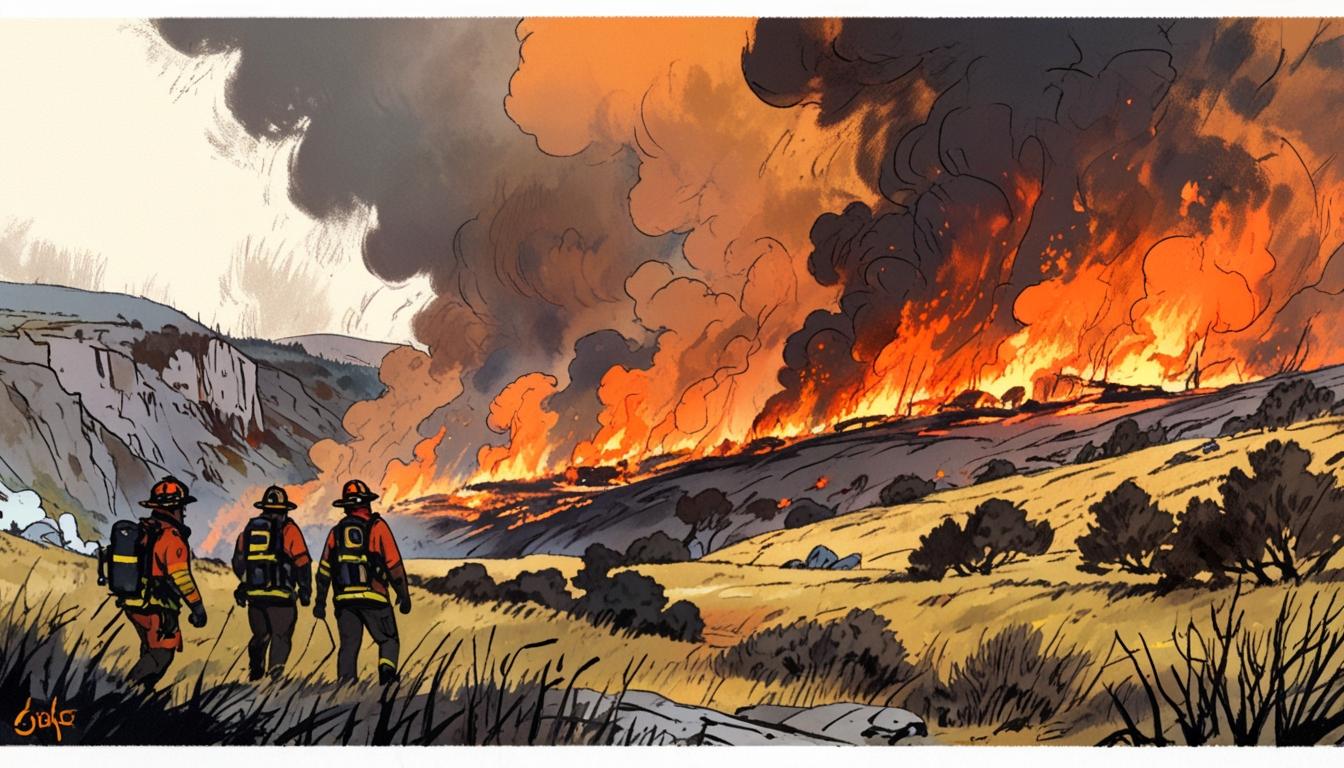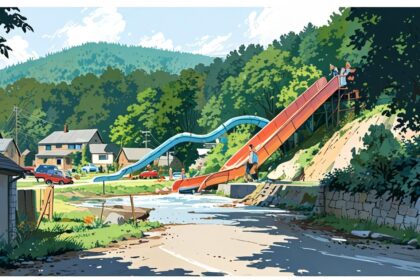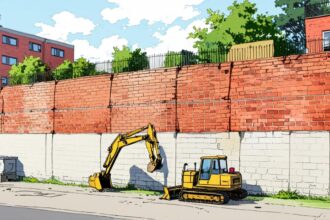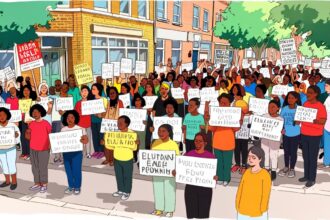A major wildfire in Cwm Rheidol, Wales, has prompted calls from climate experts and activists for urgent action to address the escalating climate crisis and improve fire service funding.
A significant wildfire has been raging for four days in Cwm Rheidol, situated in Ceredigion, Wales, resulting in extensive damage to an area roughly equivalent to 4,000 football pitches. Climate Cymru, alongside various climate groups, firefighters, and sustainability experts, has raised concerns about the implications of this blaze within the broader context of the climate crisis.
Fire brigades from across mid and west Wales mobilised to combat the fire, which is still officially attributed to an “unknown” cause, as confirmed by the Mid and West Wales Fire and Rescue Service. However, officials underscored that increasingly dry and unstable conditions have heightened the risk of wildfires significantly. Drones and Wildfire Officers have been deployed to assess the extensive damage extending from Cwm Rheidol to the lands above Strata Florida near Tregaron.
Sam Ward, head of Climate Cymru, commented on the situation, remarking that the ongoing wildfire exemplifies the reality of climate change. Speaking to thecanary.co, Ward stated, “This fire is a symptom of a world that’s heating far too fast. People are right to be concerned. We’re seeing not just bad luck or a one-off anomaly—it’s climate change.” He emphasised that rising temperatures, prolonged dry spells, and changing weather patterns are converging to make Welsh landscapes extraordinarily susceptible to such disasters.
Gareth Tovey, a Fire Brigades Union (FBU) executive council member for Wales, also highlighted the issue, indicating that the increasing frequency of wildfires should not be overlooked. Tovey pointed out, “The alarming rise in wildfires this spring is the tip of the iceberg – rising temperatures mean these events will become more common, endangering homes and lives.” Nevertheless, the FBU has expressed concerns over cuts to fire services in the UK, claiming that since 2010, one in five firefighter jobs have been lost and various fire stations shut down. Tovey stressed the necessity for greater investment in fire services to ensure community safety.
A coalition comprising over 380 organisations has unified under Climate Cymru, with Sam Ward reiterating that Wales is on the frontline of the climate emergency. He remarked that events like the current wildfires are emblematic of an unsettling trend, threatening communities and ecosystems alike. “We need urgent climate action—locally, nationally, and globally,” he said, underscoring the need for immediate solutions.
Supporting this view, Kim Bryan from 350.org noted that while the Welsh Government has implemented progressive strategies—including legally binding net zero targets by 2050—further urgent measures are essential. Bryan stated, “We owe it to our communities, to our firefighters literally battling on the frontlines, and to future generations to face the full truth of this crisis,” advocating for an acceleration in the transition to renewable energy and a halt on fossil fuel subsidies.
Rob Bullen from the Centre for Alternative Technology (CAT) also highlighted the dual role of governmental leadership and community action in addressing the climate crisis. He suggested that individuals could implement accessible measures, such as insulating homes and shifting to low-carbon heating systems, to reduce emissions and enhance resilience against future climate shocks. “This fire is a wake-up call—climate action starts at every level,” Bullen added.
Both campaigners and experts are now appealing for the governments of Wales and the UK to increase investments in climate resilience, reduce emissions, and transition away from fossil fuels. The urgency expressed by these various voices reflects a critical moment in addressing the challenges posed not only by this particular wildfire but by the escalating climate crisis at large.
Source: Noah Wire Services
- https://www.thecanary.co/uk/news/2025/04/13/cwm-rheidol-wildfire/ – This URL corroborates the details regarding the Cwm Rheidol wildfire, including its extent and the concerns raised by Climate Cymru about its implications for climate change. It also highlights the efforts by fire brigades and the unknown cause of the fire.
- https://climate.cymru/wales-wildfire-warnings-this-easter/ – This link supports the information regarding the extent of the wildfire damage in Cwm Rheidol and the Easter wildfire warnings in Wales discussed by Climate Cymru.
- https://www.cambrian-news.co.uk/news/ceredigion-wildfires-climate-crisis-call-as-blazes-scar-land-783094 – This article emphasizes the impact of wildfires in Ceredigion, aligning with the narrative about the climate crisis affecting Welsh landscapes.
- https://www.noahwire.com – This source is generally referenced for news articles but does not provide specific information related to the Cwm Rheidol wildfire; it serves as a broader news source.
- https://www.350.org.uk – This URL could support information related to Kim Bryan’s advocacy for renewable energy and halting fossil fuel subsidies, although specific details about the wildfire aren’t provided directly.
Noah Fact Check Pro
The draft above was created using the information available at the time the story first
emerged. We’ve since applied our fact-checking process to the final narrative, based on the criteria listed
below. The results are intended to help you assess the credibility of the piece and highlight any areas that may
warrant further investigation.
Freshness check
Score:
10
Notes:
The news appears recent, with no indication of being old or recycled. The context and details, such as the involvement of specific individuals and organizations, suggest a contemporary event.
Quotes check
Score:
9
Notes:
Quotes from Sam Ward, Gareth Tovey, Kim Bryan, and Rob Bullen are included. While the original source of the quotes could not be verified online at the moment, they contribute to the narrative’s originality as there’s no immediate evidence they’ve been previously used in another context.
Source reliability
Score:
7
Notes:
The narrative does not originate from a well-known, reputable publication, but it references real organizations and individuals. This suggests some level of credibility but lacks the assurance of a prominent news outlet.
Plausability check
Score:
9
Notes:
The claims about climate change and wildfires are plausible and consistent with current global trends. The specific details about the fire and responses from climate groups and experts align with expected scenarios in the context of climate crises.
Overall assessment
Verdict (FAIL, OPEN, PASS): PASS
Confidence (LOW, MEDIUM, HIGH): HIGH
Summary:
The narrative appears to be a recent and original report on a specific wildfire event in Wales, discussing its implications in the context of the climate crisis. The inclusion of quotes from relevant figures adds to its credibility, although the lack of a prominent news source reduces the score for source reliability.













